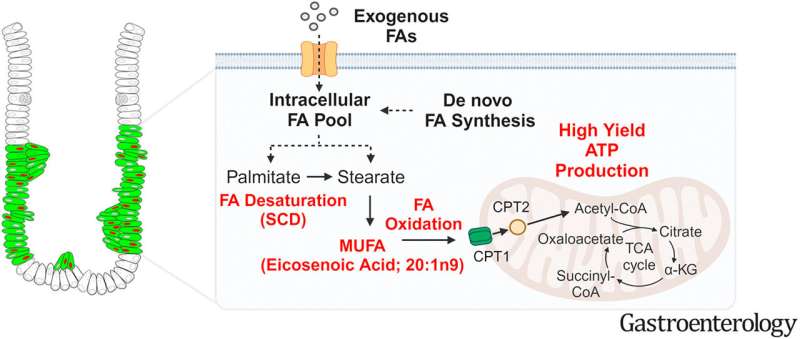This article has been reviewed according to Science X's editorial process and policies. Editors have highlighted the following attributes while ensuring the content's credibility:
fact-checked
peer-reviewed publication
trusted source
proofread
Fatty acids rewire energy supply chain in stomach cancer development, study shows

New research has revealed how metabolic changes spurred by fatty acids contribute to the transformation of cells into abnormal versions of themselves that are the precursors to stomach cancer.
The study, published Jan. 23 in Gastroenterology, showed that oncogenic metabolic rewiring is an essential adaptation for the high energy demand of abnormal, dysplastic cells.
In a mouse model, the researchers introduced the KRAS oncogene in gastric chief cells to drive a sequential carcinogenic cascade of gastric cancer and identified the metabolic reprogramming that leads to dysplastic progression by turning on altered fatty acid metabolism.
The altered fatty acid metabolism produces a long chain fatty acid, called Eicosenoic acid, through SCD (a stearoyl-CoA desaturase) and fuels the hyperproliferation of dysplastic cells. They concluded that KRAS expression drives the full spectrum of gastric carcinogenesis and that metabolic rewiring involving the fatty acid desaturation is essential for the high energy demands of dysplastic cells and carcinogenic transition of precancerous metaplasia.
While metaplasia is the process by which a cell is transformed from one form to another and is less likely to lead to cancer, dysplasia is the transformation of a cell into an abnormal version that is more likely to be carcinogenic.
"Dysplasia has been characterized by histological features and represents a high risk of developing gastric cancer," said Eunyoung Choi, Ph.D., associate professor of Surgery at Vanderbilt University Medical Center, the study's corresponding author.
"Our study demonstrates KRAS activation only in one type of gastric cells is sufficient for the full process of carcinogenesis to high-grade dysplasia in the stomach, and altered fatty acid desaturation is an essential adaptation leading to the precancerous cell lineage evolution and expansion.
"Inhibition of the desaturation step selectively targeted dysplastic cells in vivo. Furthermore, the SCD upregulation is observed across pre-cancerous lesions in gastrointestinal cancers, suggesting that SCD-dependent fatty desaturation might be a common feature observed during the gastrointestinal cancer."
Choi's lab is focused on developing a comprehensive understanding of the oncogenic roles of KRAS activation in the development of stomach cancer and the functional mechanisms of carcinogenic transformation as a critical transition stage from pre-cancer to cancer.
Her lab has established novel mouse metaplastic and dysplastic organoid lines that reprise the gastric carcinogenesis cascade. Choi explores how metabolic changes contribute to the progression of metaplasia to dysplasia, a process that is not clearly understood.
In this latest study, she and colleagues identified an altered fatty acid metabolic pathway that produces a novel Eicosenoic acid as a major energy source required for dysplastic cell proliferation and survival. The researchers noted, however, that it remains unclear how dysplastic cells generate Eicosenoic acid, and that further studies are needed to evaluate these mechanisms.
More information: Yoonkyung Won et al, Oncogenic fatty acid metabolism rewires energy supply chain in gastric carcinogenesis, Gastroenterology (2024). DOI: 10.1053/j.gastro.2024.01.027



















